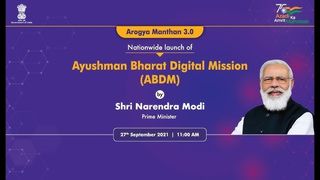Digital health ID for every Indian - We explain how it will work
Modi launches Ayushman Bharat Digital Mission

Prime Minister Narendra Modi today unveiled the Ayushman Bharat Digital Mission that will connect the digital health solutions of hospitals across the country with each other. Under this, every citizen will now get a digital health ID and their health record will be digitally protected.
“Today we are launching a mission that has the potential of bringing a revolutionary change in India’s health facilities”, the Prime Minister said.
Modi also said that with 130 crore Aadhaar numbers, 118 crore mobile subscribers, about 80 crore internet users, about 43 crore Jan Dhan bank accounts, there is no such big connected infrastructure anywhere in the world. "This digital infrastructure is bringing everything from ration to administration (Ration to Prashasan) to the common Indian in a fast and transparent manner."
- WhatsApp Pay eyes expansion by offering affordable health insurance
- HealthifyMe launches a new tool in India to find vaccination slots
One ID is good enough all hospitals across the country
What the Indian government is attempting to ease the access to the medical records of people to enable them to share digitally-stored comprehensive health profiles with providers for treatment and follow-up purposes. Currently, people find it difficult to maintain long trails of paper-based records for health interventions. These records are critical for monitoring an individual’s health status and ensuring continuity in treatment.
Already, over one lakh unique Health IDs have been created under the National Digital Health Mission (NDHM), which was first announced in the Prime Minister Independence Day speech last year. It was unveiled as a pilot project in six States and Union Territories. And now it is set for national rollout under the name Prime Minister Digital Health Mission.
This entails creating a unique 14-digit health identification number by using a person’s basic details and mobile or Aadhaar number.
The ID will provide details about individual's health and treatment history, doctors and hospitals. Further, individuals will not only be able to search for verified hospitals and laboratories, but can also evaluate the quality of services, on the basis of feedback shared by others.
Get daily insight, inspiration and deals in your inbox
Get the hottest deals available in your inbox plus news, reviews, opinion, analysis and more from the TechRadar team.
Speaking at the launch of Ayushman Bharat Digital Mission. https://t.co/OjfHVbQdT7September 27, 2021
Aside from individuals, all doctors, hospitals, diagnostic laboratories, and pharmacies will also be given a digital identity to enable a single and standardised process for completing their identification, certification and audit formalities. This information will be very useful as it is portable and easily accessible even if the patient shifts to new place and visits a new doctor.
The data, of course, is the ownership of the individuals. Personal data will be collected only after a formal consent from individuals, who, if they want to, can revoke their consent later.
“These healthcare solutions are a big investment in the present and future of the country," the Prime Minister remarked.

Over three decades as a journalist covering current affairs, politics, sports and now technology. Former Editor of News Today, writer of humour columns across publications and a hardcore cricket and cinema enthusiast. He writes about technology trends and suggest movies and shows to watch on OTT platforms.
Most Popular
